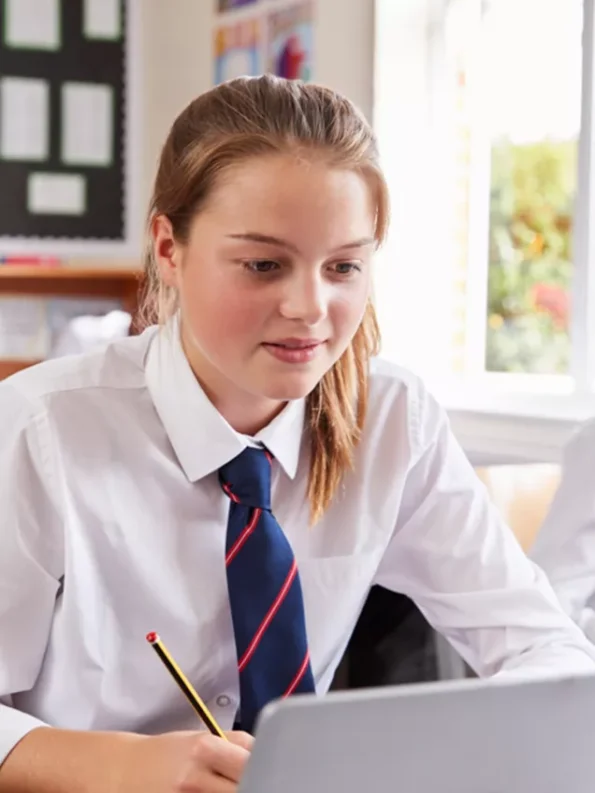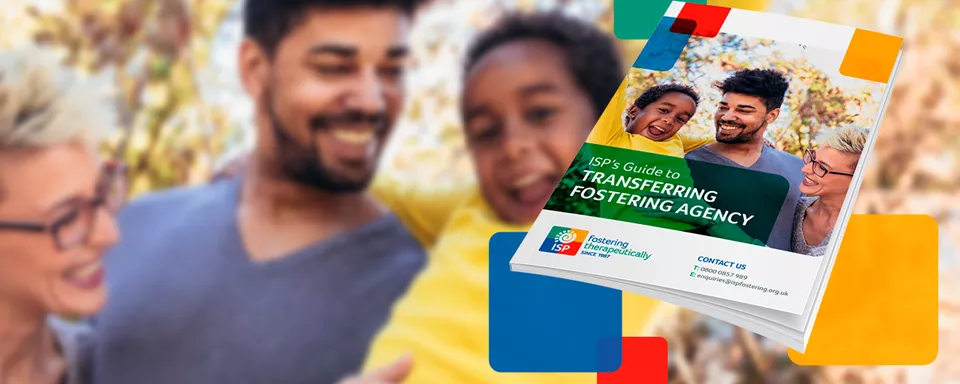
What is an EHC plan?
In this guide, you’ll discover everything you need to know about Education, Health and Care plans.
Jump to:
What is an Education, Health and Care Plan?
An Education, Health and Care Plan (also known as an ‘EHC plan’ or an ‘EHCP’) is a legal document that outlines a young person’s educational, health and social care needs. Being in foster care does not automatically mean a young person will receive or need one, although many do.
As a foster parent, you can apply for an EHCP if you feel the child in your care has additional needs which cannot be met within the school’s Special Education Needs (SEN) budget. You can also discuss this with the child’s local authority social worker, who can apply for an EHCP as the child’s corporate parent. If the application is successful, the school may receive additional funding or resources from the local authority which allows them to deliver the extra support and services your child needs.
This funding could be used to provide your child with additional one-to-one support in the classroom, regular small group work, access to speech and language therapy, or various other support resources that they may require. It also helps to provide any additional support required during exams.
The EHCP might also name a specialist education provider, if a mainstream school is not thought to be able to meet their needs. Ultimately, an EHCP is one of the tools available to help your young person get the most out of their education.
An EHCP can stay with a young person until they are 25 years old. Therefore, supporting them through the transition from primary to secondary school, and also through to college and other Further Education.
What does an EHC plan look like?
An EHC plan is a lengthy document that provides the following information…
- An overview of the young person, including their views, interests and aspirations, as well as their parents’ views.
- The young person’s special educational needs. These are categorised as:
- Cognition and learning
- Communication and interaction
- Social, emotional and mental health difficulties
- Sensory and/or physical disabilities
- The young person’s health and social care needs which are related to their Special Educational Needs.
- The desired outcomes for the young person across a range of areas, including preparing for adulthood, education, employment, relationships, independence, and health and wellbeing.
- Specific details of each special educational provision required by the young person, for example, Speech and Language Therapy.
- Any health care requirements, such as occupational therapy, specialist equipment and continence supplies.
- Any social care requirements, such as assistance travelling to facilities and practical assistance in the home.
- The name of the school or alternative education setting that the young person will attend.
- Details of the Personal Budget (if applicable) including how it will be spent to support particular outcomes.
- Any information gathered during the assessment.
Who qualifies for an EHC plan?
Children and young people up to the age of 25, who have significant and complex special education needs or disabilities are eligible to apply for an EHCP. This may include children and young people who have experienced complex trauma.
An EHCP is particularly important for young people whose individual needs cannot be met by the usual support available to students in their school or education provision.

How do you apply for an EHC plan?
There is a standard process to apply for an EHCP for your young person. This should take up to 20 weeks from start to finish, although we’ve found that it generally takes longer. And while there is a standard process to apply for an EHC plan, it can look slightly different in each local authority.
If you’re fostering with ISP, you should discuss whether your young person would benefit from an EHCP with your Advisory Teacher. If you foster with another organisation or local authority, then we recommend speaking to your social worker as the first step. Parents should speak directly to the designated teacher or SENCO at their child’s school.
Discover the steps to apply for an EHC plan below…
Approach your Local Authority
If you feel your child or young person would benefit from an EHCP, then you will need to apply for your local authority to carry out an EHC plan assessment. In order to decide whether they will carry out an assessment, the local authority may ask you for some further information, such as a letter about your child’s needs, school reports, and potentially a doctor’s assessment.
The local authority will have 6 weeks to inform you whether an EHC plan is going to be made for your young person.
Gathering evidence for the EHC plan
Once the local authority has agreed to an assessment, evidence will be gathered to support the document and ensure that your child’s needs are fully captured. At ISP, we’ll gather this evidence from teaching staff and foster parents, as well as other specialists depending on your child’s needs. These specialists could be educational psychologists, speech and language therapists or other professionals.
If you’re not fostering with ISP, you’ll need to work with your social worker, or directly with the designated teacher or SENCO at your child’s school to gather this information.
Draft EHC plan
The local authority will use the information provided to create a draft EHCP. This will be shared with everybody involved in the process, including yourself. Collectively, you’ll have 15 days to respond with any comments. This includes whether you believe your child would benefit from going to a specialist education provider.
Receive Final Document
After receiving your feedback, the local authority will make changes to the draft document and issue the final EHC plan. The process to get an EHC plan should take 20 weeks from the date the local authority receives the initial assessment request. However, from our experience, they often take longer.
Appealing a decision
There are a number of reasons why a request for an EHCP may be rejected. For example, if a child is not deemed to be far enough behind their peers, or if there is a lack of diagnosis on the special educational needs of the child.
If you disagree with a decision and cannot resolve it with the local authority, then you can appeal to the Special Educational Needs and Disability (SEND) Tribunal.
This could include issues with:
– The local authority’s decision to not carry out an assessment
– The local authority’s decision to not create an EHCP
– The additional SEND support detailed within the EHCP
– The school named in the EHCP
The Annual Review of an EHC plan
EHC plans are reviewed every year at an Annual Review meeting with the school. You will be invited to attend and contribute to the meeting, alongside other professionals working with your young person.
During the meeting, it will be decided whether the EHCP remains the same, needs to be updated (for example, if your young person’s needs have changed), or whether it can be ended.
It’s very unusual for an EHCP to be ended but if it’s deemed that a young person no longer needs the additional support and funding – for example, the young person has left education – then the EHCP may be terminated. There is an appeal process though if you do not agree with the decision.

Benefits of an EHC plan
There are many benefits of having an EHC plan for a young person with complex needs. First and foremost, it provides the school with extra funding to pay for additional support and services that will help your young person reach their potential in education.
It’s also a legally binding document, where the support that has been detailed within the plan must be provided by the education provider. Therefore, if the Local Authority fails to deliver the provision set out in the EHCP, then it can be resolved at a judicial review.
Other benefits of having an EHC plan include:
- It covers your young person’s social, emotional, cognitive and learning needs.
- It states the provision a young person needs regardless of any Local Authority funding issues.
- It will name a specific school, including specialist and independent provisions.
- It runs up until a young person finishes education or turns 25, and covers further education and apprenticeships. Sadly, it cannot be transferred into university settings.
What is the difference between an SEN statement and an EHC plan?
The EHCP replaced the Statement of Special Educational Needs (SEN) in England in 2014. The EHCP takes a more holistic approach to the child’s needs, so it covers their education, health and social care needs.
Historically, a set number of hours were allocated to a young person who had a Statement of Special Educational Needs. But with an EHCP, funding is provided to the school so they can cover the cost of additional support and services needed by the child. This enables a more personalised support package for children with complex needs and/or disabilities.
There are a number of other key differences between an EHC Plan and the old Statement of SEND, including:
- An EHCP looks at the young person’s needs in relation to education, health and social care, while the Statement of SEND only considered their educational needs.
- Parents and foster parents can contribute to the EHCP, while previously they could only object to the Statement of SEND.
- With an EHCP, resources can be used flexibly to allow parents to make some choices about the provision their young person receives. Resources were provided directly to the school with a Statement of SEN.
- A Personal Budget may be available to some families supporting a young person with an EHCP. This wasn’t available with a Statement of SEN.
- It takes around 20 weeks to produce an EHCP, whereas it used to take 26 weeks for a Statement of SEN.

Changing schools with an EHC plan
Local authorities are required to review and update EHC plans when a young person is within 12 months of transitioning to the next phase of their education or training. The updated document must include the name of the school or alternative education provider that the child will attend post-transfer.
The amended EHCP should be issued by the following deadlines:
- Transfer from secondary school to further education post-16: Review to take place by the 31st of March in the same calendar year.
- Any other school transfer: Review to take place by the 15th of February in the same calendar year.
- Transfer from one further education institution to another (post-16): Review to take place at least 5 months prior to the move.
Once issued, you will have 15 days to provide feedback on any proposed changes to the EHCP, and also request for a particular school or another education provider to be named.
The local authority cannot refuse to name a school because the request doesn’t meet the school’s admissions process criteria, or because the school’s admissions process has not yet been completed. If the local authority refuses to name the school that you have requested and is not able to provide a lawful reason for doing so, then you can appeal to the SEND Tribunal.
Additional support should continue at the level outlined in the young person’s EHC plan through a young person’s education, regardless of any changes in the school. Any changes to the provision required must be supported by evidence of the young person’s needs, and you should have a chance to comment on these proposed changes.
Speak to your young person’s school SENCO or designated teacher if you need any further advice. If you foster with ISP, then of course, your advisory teacher will help you to ensure your young person continues to receive the same high level of support throughout their education journey.
Further reading for EHCPs
We hope you’ve found our guide to Education, Health and Care Plans useful. Please find below some other resources around EHCPs that you might find useful:

Education Hub

Special Educational Needs
This guide will help you understand special educational needs and how to support the young person in your care.

My child won’t go to school
We explore some of the reasons why a child in your care may be refusing to go to school and what you can do to help.

My child’s been excluded
Don’t worry, you’re not alone. Here’s what you need to do if a child in your care has been excluded from school.

Help your child at school
Our experts provide their advice on ways to help the young person in your care thrive at school.
